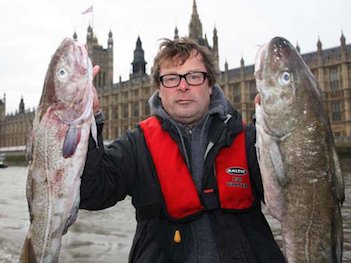Overfishing is Underestimated
When it comes to wildlife conservation most people only think about land animals like a cute panda, the majestic tiger, and Cecil the lion. Life in the Ocean is treated as a second class citizen. Pescetarians swear off animal meat because they find the notion of killing a living mammal to satisfy their indulgences unjust when there are other sources of sustenance available but they have no moral qualms over deboning a nice fillet of fish.
Fishing quotas, such as the EU common fisheries policy are in place to try maintain a sustainable balance of fish populations in our seas and oceans but these are often flaunted, inadequate, and hard to police. A new paper published in Nature now says that we have underestimated the amount of global fishing. The global peak of fishing was in 1996 and the official report of the Food and Agriculture Organization of the United Nations estimated the number of fish caught at around 86 million tonnes per annum at that time and a very low decline rate since then. The ten year study in Nature reports that this number was far closer to 130 million tonnes of fish in 1996 and that this figure has decreased since 1996 but this is partly due to the collapse of certain fish populations no longer available to trawlers according to a lead author on the paper, Daniel Pauly. This new estimated figure still puts our current global fishing rate far in excess of 86 million a year at over 100 million tonnes of fish per annum.
The research was independently carried so as to avoid political, economic or commercial biases. It was based primarily in the University of British Columbia but involved hundreds of researchers around the world reconstructing the level of fish consumption and catch rates on the ground level on a country by country basis. So why was there a difference between the official Food and Agriculture Organization figures and that of this new research paper? Pauly says that the UN data submitted by each country doesn’t always account for small scale fisheries or dead fish that is thrown back into the sea by net trawlers because they were not fishing for that specific species. The discards from trawlers are a problem heightened by quotas unfortunately. Because they were are only allowed to bring in a certain amount of fish to port each year they circumvented it through discarding perfectly healthy but less valuable fish that was caught in their nets. Up to two-thirds of fish caught and already dead or dying was being discarded.

The waste in net fishing is disgraceful and only perpetuated by fashionable fish trends in restaurants which cause people to gravitate their taste towards particular types of fish disregarding the taste value of other less fashionable species. This is something that celebrity chef Hugh Fearnley Whittingstall fought successfully against as he called for UK ministers to support a ban of discards in the EU in 2010 and convinced fish and chip shops across the UK to popularise a more sustainable fish than cod on their menus. However, the EU moves slowly and the all out ban doesn’t fully come into effect until 2019. In 2015 the North Western Waters group chaired by Ireland and including Belgium, France, Spain, the Netherlands, and the UK committed to heavily reducing the discards in their waters starting with a ban in key whitefish and prawn industries. The first landing obligation measures have been in place in the North Western Waters group waters since January 1st 2016 and require all fish caught onboard key fisheries to be brought to port. Undersized fish will not be allowed to be sold for human consumption to discourage practices which catch younger fish that are crucial to maintaining stock levels.
The hardest part for fish-lovers concerned about sustainability is knowing what fish is actually sustainable and which are overfished. If the figures in the Nature publication are correct then our assumptions about sustainable fish levels could have been based on a figure that is off by millions. There are apps out there however which help us make better decisions about what fish we eat but sometimes there are no hard and fast rules depending on where and how a potentially sustainable fish is sourced. Sometimes the safest option is not to eat fish at all. Pescetarians may have to think twice. The good news is that Ireland is a world leader in organic aquaculture which cultivates farmed quality organic salmon and mussels that are much more sustainable to eat. So there may be some hope for the Irish fish industry and a more sustainable future.
Main image: Skitterphoto
